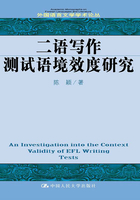
1.3 Significance of the present study
Given the conflicting findings of the effects of contextual features on writing performance and the paucity of empirical research on the effects of contextual features in L2 writing literature, the present study investigated the impact, if any, of contextual features on the process and product of Chinese college students' EFL writing under the testing conditions. Thus, empirical evidence from this study would hopefully provide a theoreticallybased and empirically-tested framework which could be used to design and construct improved writing assessments which may produce beneficial washback effects on the teaching and learning of EFL writing in China.
Writing process and written product are the two main aspects in the field of writing research. More often than not, researchers tend to focus on one aspect to the exclusion of the other. However, the dichotomy between the process and product of composing is not desirable since the two aspects, in effect, mutually corroborate, inform, and enrich each other. The present study thus combines both product and process analyses to investigate the possible impact of contextual features on test-takers' writing performance. Therefore, this study could capture a full picture of the effects of contextual features on Chinese undergraduates' writing performance.
Further, the present study examines the textual features, as quantified by the text features such as fluency, complexity, accuracy, coherence,audience awareness, and purpose awareness. Thus, this study is expected to display in full the differences in the essays written by Chinese college students on the writing tasks with different degrees of contextual features.
Moreover, despite acknowledgement that writing has an affective dimension that involves motivation and interest (Hayes, 1996), this affective domain is a relatively unexplored area in writing research (Wong, 2005), particularly in the field of writing assessment. In addition to the cognitive processes occurring during the writing process, the present study also investigates test-takers' attitudes towards and interest in tasks with different degrees of contextual features. Therefore, the information gained can contribute to a better understanding of the effects of contextual features on test-takers' writing processes, both cognitively and affectively.
Finally, taking into account that writing is a complex process, a variety of research methods and instruments will be adopted in the present study to facilitate validation and triangulation (e.g., Seliger & Shohamy, 1989: 122). The methods employed in this research include expert judgment, writing tests, questionnaire surveys, observation, retrospection, and interviews. By adopting such a multi-method design, we could maximize the advantages of one particular research method while offsetting its inherent weaknesses, hence enhancing the overall validity of the present study.